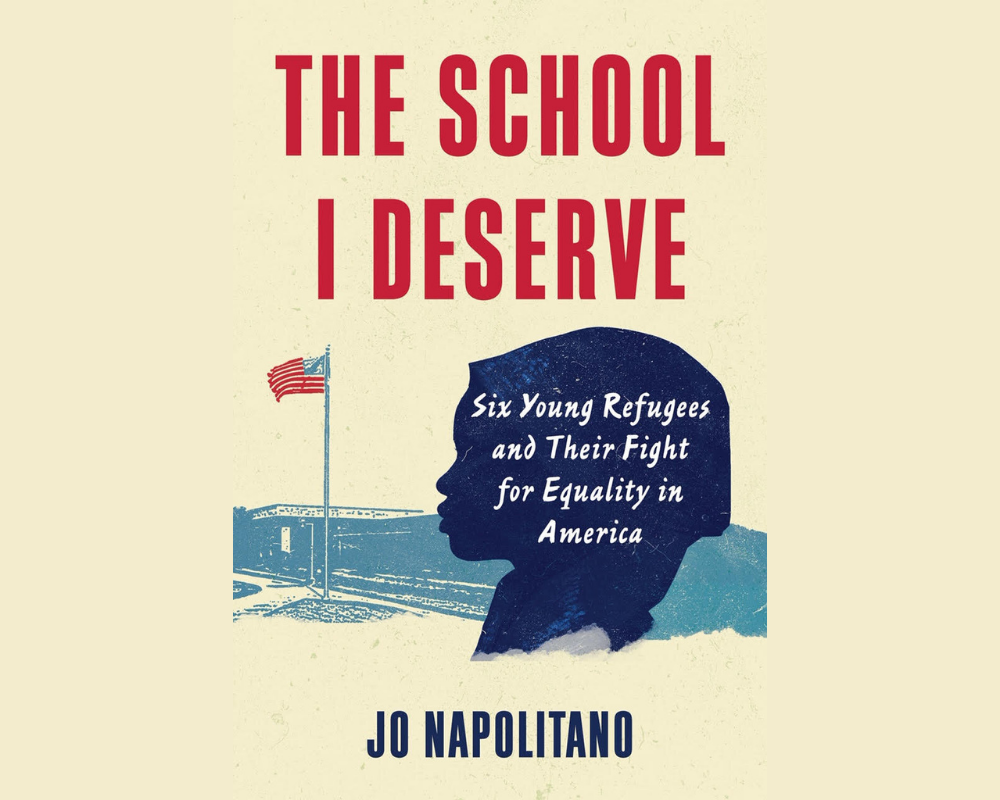By Eric Ferrero, Executive Director
Jo Napolitano’s remarkable new book, “The School I Deserve: Six Young Refugees and Their Fight for Equality in America,” (Beacon Press) is out today. The book details the civil rights battle waged across the country on behalf of immigrant children denied access to education in the nation’s public school system. It tells this larger story through one federal lawsuit in Pennsylvania where several young refugees demanded to be heard.
Napolitano has worked as a journalist for two decades, reporting for The New York Times, Chicago Tribune and Newsday. After she learned that some public schools in New York were turning away unaccompanied minors in 2014, she discovered a nationwide trend. She won a year-long Spencer Education Fellowship at Columbia University to work on a book about the issue and applied for a grant from the Fund for Investigative Journalism to cover some of her reporting costs. Specifically, she needed funding to travel to several U.S. states and meet families with children who were blocked from attending public schools.
“The School I Deserve” has received early raves. Kirkus called it “an eyebrow-raising report that is both enraging and heartbreaking,” and Publishers Weekly called it “laden with compassion … an eye-opening account of a precedent-setting case.” I asked Napolitano to share more about how she reported the book and what advice she has for other investigative journalists.
Q: You started working on this project when the students in Pennsylvania, who had experienced significant trauma as refugees, were still involved in a major federal lawsuit. How did you get them to trust you with their stories, and how did you get their lawyers on board?
I learned of the lawsuit only days before the students went to trial. I sat through the week-long proceedings, introduced myself to the attorneys involved and told them I was planning either a long-form story or book on the topic. I was particularly interested in Khadidja Issa, the young woman at the heart of the case. The lawsuit bore her name. I met with Khadidja and her entire family twice a week for more than a year, driving three hours to and from their home from New York City. I was a Spencer Education Fellow at Columbia University at the time and had a somewhat flexible schedule. Khadidja did not speak much English, but her younger siblings did. They’d grab my notebook, cell phone and pens: They clearly wanted to play and I was happy to comply. I grew to care about all of them. Eventually, I brought in a couple of Fur translators (Fur is spoken in Darfur, Sudan) and we had a couple of hours-long talks in which Khadidja and her mother opened up about their past. Later on, as Khadidja learned English, I was able to talk with her more directly. We still speak often, about twice a month through WhatsApp.
Q: Amy Ellis Nutt said that your exhaustive research for this book reveals the consequences of inequality. What approaches and tools did you use in your research – both to dig into the issue and to identify children and families?
Amy’s review made me cry. I was so happy she appreciated the research: It took years. I examined the records of kids crossing the border, the earning potential of high school dropouts, the number of refugees admitted to the States through the years and the history of Islam in America. I took a look back at a particularly harrowing set of murders in Lancaster, PA, where the book is centered and peeked in on nearby hate-crimes – including that of a group in Harrisburg that considered detonating a bomb at a rally on the capitol steps. I examined how the human brain reacts to chronic stress and life inside Joe Arpaio’s Maricopa County from the perspective of the local school district. I tracked down an undocumented high school valedictorian, talked to an ESL teacher who grew up as a migrant farmworker and relayed a young immigrant’s account of his time with his smugglers. I observed a border immigration court, talked to a teacher who taught inside a holding cell for unaccompanied kids and pored over court records. The book included passages critical of the local school district and the private company that runs two of its campuses: I read the book to both and gave them an opportunity to respond. This process, which began with a LexisNexis search of the term “immigrant education,” took five years.
Q: The book takes place against the backdrop of deep political polarization. You note that the lawsuit was playing out in one of the tightest swing states in the country before, during and after the 2016 election, with rhetoric around immigration at a fever pitch. How did you approach this project to try to get past political divides and deepen public understanding of both the problems and the solutions related to discrimination in education?
I want people to see Khadidja as they would any other child. If it would be an outrage to deny any student in America an education, then it is an outrage to deny Khadidja. Khadidja is smart, capable, determined and mature. She survived a decade inside a squalid refugee camp where food was scarce and money nearly impossible to earn in any meaningful amount. When her father, Adam, died on his way to work (he toiled on a farm about an hour away from the encampment on foot), she joined her mother in taking his place. At first, she could only babysit her three younger siblings but as soon as she was able, she joined in back-breaking labor. Khadidja is one of the brightest, most optimistic, open-hearted and fearless people I have ever met. Surely, such a student would be a great asset to any school if only given the opportunity to learn.
And I used myself as an example, too. I was born in Bogota, Colombia, abandoned by my birth mother at a bus stop a day later, placed in an orphanage where I was barely fed and nearly died of starvation before I was adopted in the States. I share this story with readers in a brief introduction talking about the transformative nature of education for the world’s poorest kids.
Q: As a first-time book author, what do you wish you’d known at the very beginning of the process, and what other advice do you have for journalists who are thinking about writing their first book?
In my opinion, there are only two things which carry over from journalism to book writing: interviews and research. Otherwise, they are quite unalike. In book writing, characters have to grow and change. In nearly all news stories, the timeframe is too short for that kind of development.
Also, I had a tough time writing a good book proposal because book proposals contradict how journalists are taught to write. This is particularly true of chapter summaries. Journalists are taught to show, not tell. Book proposals, outside of the sample chapter, are all tell. My initial book proposal needed a lot of help. My chapter summaries were extremely long and dry because I felt I needed to show all I know.
Aspiring authors should also note that book proposals are essentially marketing documents. You must be able to identify your audience and envision a place for your book on a shelf at a bookstore. Publishers are in the business of selling books. You need to know where yours fits in – and part of that is through identifying similar works that have sold well in the last five years.
Q: Your grant proposal outlined statistics, stories and your qualifications, as well as your own personal history with immigration, poverty and education. What do you think we all need to do – especially funders and publishers – to support more journalists of color who bring first-hand experience to telling stories that have long been ignored or marginalized in traditional media?
Money helps. This book would not be possible without the Fund for Investigative Journalism. Keep in mind that most immigrants don’t have a long history of family wealth. It is money and opportunity—not talent or ability—that keeps people from book writing. If we want to hear more stories of this nature, we need to gainfully employ more minorities and women, encourage, fund and support their work. It’s that simple.




